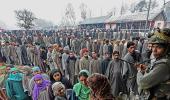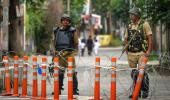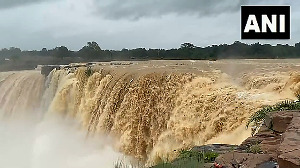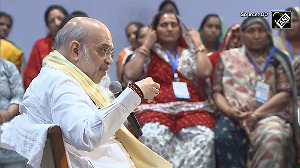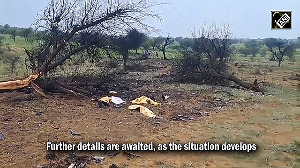'Our confidence has been strengthened by the fact that the Supreme Court has decided to examine the Constitutional validity of all that has been done on August 5.'
'That in itself is an achievement because the Supreme Court could have very well said you don't have a case at all.'
'The very fact that the honourable court has decided to admit it for regular hearing, and refer it to a Constitutional bench, tells us that the Supreme Court has found merit in our case.'
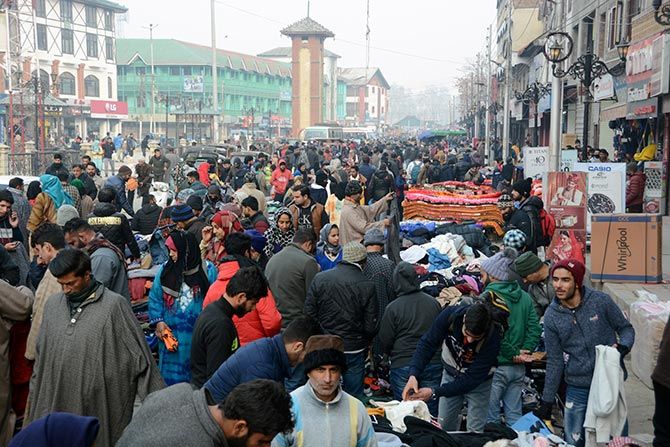
Normal life has been disrupted in Jammu and Kashmir from August 5, when the Centre announced the scrapping of Article 370 conferring special status on Jammu and Kashmir and breaking up the state into two Union territories, Jammu-Kashmir and Ladakh.
With the Internet shut down and telephone lines down to prevent the spread of rumours, communication has been badly hit.
While landline connections and SMS services were subsequently restored, political activists including the Abdullahs, Mehbooba Mufti, et al have been under house arrest, preventing any political activity.
A five-judge Constitution Bench of the Supreme Court has started hearing the petition against the scrapping of Article 370.
Interestingly, in October 2015, Justice Hasnain Masoodi of the Jammu and Kashmir high court had ruled that Article 370, conferring special status on the border state, was a permanent feature of the Constitution of India.
The retired judge is now a member of the Lok Sabha from Anantnag in Kashmir representing the National Conference.
"There is a huge gulf between the core thinking of our party and that of the political forces presently holding the reins of power in New Delhi. Article 370 had so many positive dimensions, but the present dispensation in New Delhi thinks it was a negative thing," Justice Masoodi tells Athar Parvaiz in an interview for Rediff.com.
The Supreme Court has started hearing the petitions against Parliament's August 5 decision to scrap Article 370. How hopeful are you about a positive outcome?
We were always confident about our case. And that confidence has now been strengthened by the fact that the Supreme Court decided to examine the Constitutional validity of all that has been done on August 5.
That in itself is an achievement because the Supreme Court could have very well said that you don't have a case at all. But the very fact that the honourable court has decided to admit it for regular hearing, and refer it to a Constitutional bench, tells us that the Supreme Court has found merit in our case.
Secondly, the honorable court has not allowed things to get delayed. We have some 10 petitions in the court; hearing on one of them is going on and those of others will follow.
We have no doubt in our mind that we have a rock-solid case. We believe that whatever they did with us -- be it scrapping our special status or bifurcation of the state -- cannot be sustained.
We firmly believe that it is a gross violation of the Constitution which will not stand scrutiny of the Supreme Court.
As per the Reorganisation Act after New Delhi's August 5 decision, as many as 153 Acts of the former state of Jammu and Kashmir have been repealed and 106 new laws have been applied to Jammu and Kashmir. How do you perceive this scenario?
Our stand is clear; we say it is not the question of how many new laws have been applied and whether they are beneficial or not. Our thinking is totally different when it comes to the implementation of laws in Jammu and Kashmir -- we see under whose jurisdiction the law-making falls; it is more about our autonomy and identity.
For example, during Sadiqsahib's (G M Sadiq, former chief minister of Jammu and Kashmir) regime, we have formed so many legislations in Jammu and Kashmir after copying the central Acts -- the Industrial Disputes Act, Labour Act, Compensation Act and many others.
At that time we had thought since these are welfare legislations, we can copy any law from the Centre that is for the public good and empower disempowered sections of society and then enact it as per our own constitutional framework and compliance of our state legislature.
It was based on the policy of making our own laws, the mirror copies of central Acts in many cases, under our constitutional framework.
We made a strong RTI Act in 2009 than the Centre had made in 2005 because our constitutional mechanism provided us that kind of autonomy. But those powers (our residuary powers) have been snatched from us with the August 5 assault.
This power had enabled us to make a law called the Happy Childhood Act which they (the Centre) couldn't have dreamt of; it was not even there anywhere else in South Asia.
Similarly, we had a law called Right to Education from the 6th to 11th standards. We had it much before the amendment in the Constitution of India.
Some people say the central Forest Act, which has been applied to Jammu and Kashmir, should be used by the Gujjars and nomads of Jammu to get forest rights. Do you agree?
We don't see it that way. Our viewpoint is clear -- we say we used to make laws on our own and we should get that power back as per the sentiments of the people of the region.
By the way, the Bharatiya Janata Party had opposed implementing the Central Forest Act in Jammu and Kashmir, citing Article 370 when it was said that the law can benefit Gujjars and nomadic communities.
Also, during Mehboobaji's (Mehbooba Mufti) regime, an order was passed called the Mine and Mineral Concession Order, which had scope for outside miners to come and carry out mining operations in Jammu and Kashmir and extract minerals including sand pebbles etc.
But the BJP campaigned against it and spearheaded the opposition in the assembly saying we can't allow it because of Article 370.
Then, they made the government scrap it!
Many in Kashmir say the elected Lok Sabha members from Kashmir should have protested strongly against the August 5 decision of New Delhi and resigned. What are your thoughts?
When we are in Parliament we question them, we tell them how a Constitutional fraud has been played on us after we embraced the Union of India.
We keep agitating against it whenever we get an opportunity; we keep reminding them about the public disapproval which the August 5 assault has met.
We feel we will miss that opportunity if we put our papers in protest.
Secondly, the international media and think-tanks contact us because we represent Kashmir in Parliament.
Having said that, if our political party, which we are members of, thinks that quitting is a better option and wec can serve the public interest more efficiently, then we will not take even a second to resign.
After all, we have been elected Parliament members when the National Conference gave us its mandate to contest the election.
We have not been elected as Independent candidates. If that was the case, I could have taken the decision individually.
We need to discuss it with our party leadership and then take a decision on it. But our leadership is under detention.
Has the National Conference thought about its future course of action?
Not yet. We are not being given any chance to meet; how can we think of the future course of action?
Our leadership is not free. All our important leaders from our president to district presidents in Kashmir are under detention.
Once we are able to meet, our party leadership will take a decision on the basis of those deliberations as to what would be our future course of action.
What is your personal view? Do you think that there is a need for radical thinking?
The party leadership will take the final decision on the path we need to take post the August 5 assault.
As far as my personal views are concerned, there is a huge gulf between the core thinking of our party and that of the political forces presently holding the reins of power in New Delhi.
Article 370 had so many positive dimensions, but the present dispensation in New Delhi thinks it was a negative thing which was responsible for all the ills.
As high court judge you had ruled that Article 370 was a permanent feature of the Indian Constitution. What do you have to say about it now?
Our ruling was based on a proper understanding of the Constitution of India and the Jammu and Kashmir constitution.
Article 370 has a self-contained code which means it has a mechanism within the Article which makes it a permanent feature of the Constitution of India.
Our ruling was later echoed in the Supreme Court of India judgment in 2017, which said that notwithstanding the language, it (Article 370) has over the years assumed a permanent character and permanent feature.

